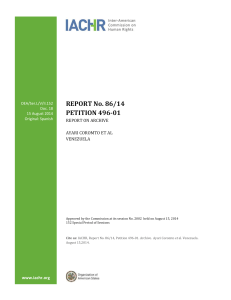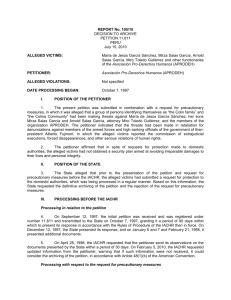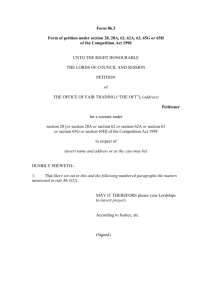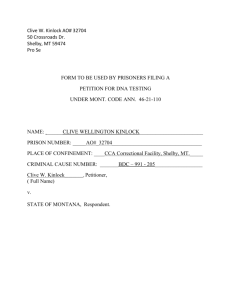Report No. 94/13 - Organization of American States
advertisement
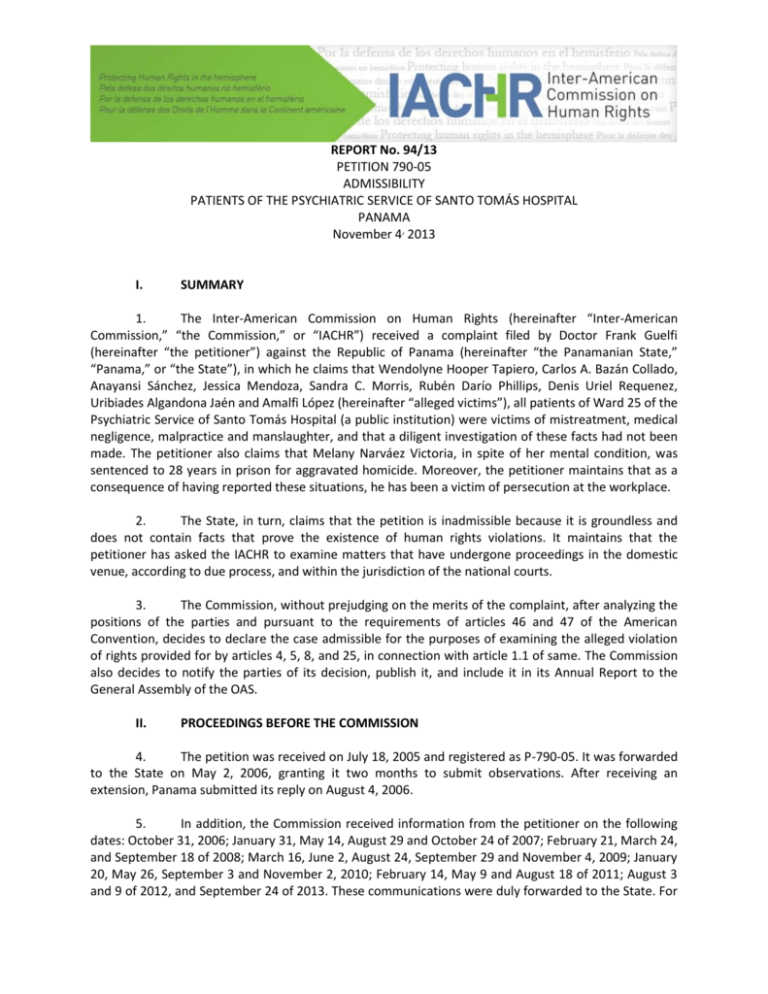
REPORT No. 94/13 PETITION 790-05 ADMISSIBILITY PATIENTS OF THE PSYCHIATRIC SERVICE OF SANTO TOMÁS HOSPITAL PANAMA November 4, 2013 I. SUMMARY 1. The Inter-American Commission on Human Rights (hereinafter “Inter-American Commission,” “the Commission,” or “IACHR”) received a complaint filed by Doctor Frank Guelfi (hereinafter “the petitioner”) against the Republic of Panama (hereinafter “the Panamanian State,” “Panama,” or “the State”), in which he claims that Wendolyne Hooper Tapiero, Carlos A. Bazán Collado, Anayansi Sánchez, Jessica Mendoza, Sandra C. Morris, Rubén Darío Phillips, Denis Uriel Requenez, Uribiades Algandona Jaén and Amalfi López (hereinafter “alleged victims”), all patients of Ward 25 of the Psychiatric Service of Santo Tomás Hospital (a public institution) were victims of mistreatment, medical negligence, malpractice and manslaughter, and that a diligent investigation of these facts had not been made. The petitioner also claims that Melany Narváez Victoria, in spite of her mental condition, was sentenced to 28 years in prison for aggravated homicide. Moreover, the petitioner maintains that as a consequence of having reported these situations, he has been a victim of persecution at the workplace. 2. The State, in turn, claims that the petition is inadmissible because it is groundless and does not contain facts that prove the existence of human rights violations. It maintains that the petitioner has asked the IACHR to examine matters that have undergone proceedings in the domestic venue, according to due process, and within the jurisdiction of the national courts. 3. The Commission, without prejudging on the merits of the complaint, after analyzing the positions of the parties and pursuant to the requirements of articles 46 and 47 of the American Convention, decides to declare the case admissible for the purposes of examining the alleged violation of rights provided for by articles 4, 5, 8, and 25, in connection with article 1.1 of same. The Commission also decides to notify the parties of its decision, publish it, and include it in its Annual Report to the General Assembly of the OAS. II. PROCEEDINGS BEFORE THE COMMISSION 4. The petition was received on July 18, 2005 and registered as P-790-05. It was forwarded to the State on May 2, 2006, granting it two months to submit observations. After receiving an extension, Panama submitted its reply on August 4, 2006. 5. In addition, the Commission received information from the petitioner on the following dates: October 31, 2006; January 31, May 14, August 29 and October 24 of 2007; February 21, March 24, and September 18 of 2008; March 16, June 2, August 24, September 29 and November 4, 2009; January 20, May 26, September 3 and November 2, 2010; February 14, May 9 and August 18 of 2011; August 3 and 9 of 2012, and September 24 of 2013. These communications were duly forwarded to the State. For 2 its part, Panama submitted information on December 14, 2006; March 20, June 27 and December 13, 2007; May 22 of 2008; April 20 and August 26 of 2009; May 20 of 2011; May 24, June 3, and July 12 of 2013. These communications were duly forwarded to the petitioner. 6. In an August 3, 2012 communication, the petitioner stated his interest in attending a hearing during the 146th regular period of sessions of the IACHR, to address issues related to the petition. The IACHR informed him on October 24, 2012 that, due to the high volume of hearings requested, it would not be possible to grant him his request. III. POSITION OF THE PARTIES A. The petitioner 7. The petitioner, a psychiatrist at the Santo Tomás Hospital at the time of the alleged facts, contends that the patients of the psychiatric service of Public Hospital Santo Tomas, Wendolyne Hooper Tapiero, Carlos A. Bazán Collado, Anayansi Sánchez, Jessica Mendoza, Sandra C. Morris, Rubén Darío Phillips, Denis Uriel Requenez, Uribiades Algandona Jaén and Amalfi López, were victims of maltreatment, medical negligence, malpractice and manslaughter, all of which were not duly investigated. He also maintains that Melany Narváez Victoria, with mental disabilities, was convicted and sentenced for a crime that she committed due to her psychiatric condition, using a judicial assessment allegedly contradictory to the one made by the petitioner in his report rendered as an expert witness during the proceedings. In addition, he maintains that, due to having reported these facts, he has been persecuted at the workplace. 8. He specifically reports that Wendolyne Hooper Tapiero was granted permission by a hospital doctor, allegedly acting negligently, to leave the hospital, as a result of which her life was in danger. Ms. Anayansi Sánchez’s attending physician was changed when her life was in danger. Regarding Jessica Mendoza, the petitioner states that she was a victim of “Nazi experiments” and of an allegedly negligent suspension of medication. Sandra C. Morris, due to negligent medical attention, suffered negative effects to her health and subsequently jumped from a fourth floor. Rubén Darío Phillips received negligent medical care. Denis Uriel Requenez was the victim of irregularities and negligence in the medical treatment he received; he ended in a state of depression that led him to commit suicide. The petitioner states that Amalfi López and Uribíades Algandona Jaén received negligent medical care. The latter, according to the information provided by his widow, although he suffered from dengue, diarrhea, and complained of strong headaches, was never given medicine to alleviate his suffering.1 According to a report from the Santo Tomás Hospital itself, Carlos A. Bazán Collado was admitted on July 2, 1998 due to an autolytic attempt, i.e., an attempt to commit suicide. Six days after having been admitted, and due to the allegedly negligent medical attention he received, he committed suicide.2 The petitioner further claims that all these facts were reported to the national authorities but the investigations were conducted negligently and with many irregularities. 1 Letter from Zulekia Argentina Torres, addressed to the General Medical Director, March 10, 2007. 2 According to the Patient Report of the Psychiatric Service of Santo Tomás Hospital, Panama, dated October 30, 2006, the dates on which the aforementioned alleged facts occurred were as follows: a) Wendolyne Hooper Tapiero was hospitalized nine times between September 16, 1992 and April 24, 1998; b) Jessica Mendoza Bautista was in the hospital from June 9 to July 28, 2000; c) Sandra Cristina Morris was in the hospital from March 3 to April 17, 2003; d) Rubén Darío Phillips was in the hospital from June 29 to July 10, 1998; e) Denis Uriel Requenez was admitted twice, between September 27 and November 15, 2004, and f) Carlos Bazán Collado was hospitalized from July 2 to July 8, 1998. 3 9. The petitioner reports that, regarding Melany Narváez Victoria, the alleged victim was sentenced to 28 years of prison for the crime of aggravated homicide. He contends that although the decision sentencing her states that the alleged victim had the ability to understand the unlawfulness of her acts, according to the expert psychiatric report written by him, this conclusion could not be drawn. 10. Regarding the violations committed against him, the petitioner claims that because he had reported the violations committed, he was the victim of acts of persecution and harassment in the workplace. In addition, he reports that on February 29, 2008 he was dismissed from his position as a psychiatrist of the Santo Tomás Hospital, in retaliation for the report he filed on January 29, 2008 before the Office of the Attorney General of the Nation [Procuraduría General de la Nación (PGN)], related to the suspected commission of crimes against the life and integrity of Uribiades Algandona Jaén and Amalfi López. 11. With respect to the criminal investigations and other proceedings initiated based on the alleged facts, the petitioner’s statements are presented in greater detail as follows: Proceeding regarding Wendolyne Hooper Tapiero, Carlos A. Bazán Collado, Anayansi Sánchez, Jessica Mendoza, Sandra C. Morris, Rubén Darío Phillips and Denis Uriel Requenez 12. In this regard, the petitioner claims that the following motions were filed: i) Report filed before the PGN. The petitioner reports that on June 22, 2005 he filed the aforementioned complaint against three physicians of the Psychiatric Service for the crimes of maltreatment, medical negligence, malpractice and manslaughter. He states that the case was heard by the Third Municipal Court of the District of Panama, Criminal Branch [Juzgado Tercero Municipal del Distrito de Panamá – Ramo Penal] and that the investigation was charged to the Office of the Second Municipal Prosecutor of the First Judicial District of Panama [Personería Segunda Municipal del Primer Distrito Judicial de Panamá].3 He states that irregularities were committed during the investigation and that as a result, on August 22, 2006, the Third Municipal Court [Juzgado Tercero Municipal] handed down a ruling dismissing the case without prejudice [sobreseimiento provisional]. It can be inferred from the information submitted that the complainant Ms. Zapata, widow of Denis Uriel Requenez, filed an appeal against the ruling before the Court of Appeals and Consultations of the First Judicial Circuit of Panama, Criminal Branch [Tribunal de Apelaciones y Consultas del Primer Circuito Judicial de Panamá – Ramo Penal], which was denied on August 7, 2007 on the grounds of its untimeliness. ii) According to the petitioner, among the irregularities committed in the proceedings initiated with his June 22, 2005 report, are the following: a) the avoidance, in an irregular manner, of the taking of testimonial evidence, since the testimony of the next of kin of the patients and of the medical personnel that was caring for them was not considered; b) the use, as the main evidentiary item, of an expert report that had not been prepared with due diligence, based only on “progress notes” and “the reading of incomplete files,” and without considering information that could have been provided by relevant actors to clearly establish the facts occurred; and c) that the Forensic Technical Board [Junta Técnica Forense], in charge of the drafting of the said report, was composed of professionals that had ties of friendship with one of the persons being investigated. 3 The plaintiff in the case was Ms. Ana Zapata de Requenez, widow of Denis Uriel Requenez. 4 iii) Report filed against officials of the Office of the Second Prosecutor [Personería Segunda] and the Forensic Medical Board [Junta Médica Forense]. The petitioner states that due to the alleged irregular actions that took place during the aforementioned investigation, on August 3, 2006 the petitioner filed a report against the functionaries of the Office of the Second Municipal Prosecutor [Personería Segunda Municipal] (the second Prosecutor [Personero Segundo] and the Judicial Secretary [Secretaria Judicial]) and the three psychiatrists that prepared the expert report, for crimes against public administration [delitos contra la administración pública]. Information in the case file indicates that the report was filed before the Seventeenth Court of the First Judicial Circuit of Panama, Criminal Branch [Juzgado Décimo Séptimo del Primer Circuito Judicial de Panamá – Ramo Penal], and that the investigation was led by the Office of the Third Anticorruption Prosecutor [Fiscalía Tercera Anticorrupción] which – according to the petitioner – had not seriously investigated the facts reported but that, to the contrary, had engaged in a subjective defense of those indicted. He adds that, as a result of certain irregularities,4 on August 24, 2007, the court handed down a ruling dismissing the case without prejudice. On September 14, 2011, the Seventeenth Court of the First Judicial Circuit of Panama, Criminal Branch, denied a motion to reopen the investigations related to the crimes against public administration. iv) Report against the head prosecutor of the Office of the Third Anticorruption Prosecutor. Because of the manner in which the second investigation was being conducted, on February 22, 2007 the petitioner filed an administrative complaint before the PGN against the head prosecutor of the Office of the Third Anticorruption Prosecutor for the alleged commission of crimes against public administration. It is observed that in Decision [Resolución] No. 38 of November 29, 2007, the PGN declared that it had not been proven that an infraction had been committed and ordered the case file to be closed. The available documents indicate that the petitioner, on December 17, 2007 filed a motion for reconsideration of the aforementioned ruling.5 Proceeding regarding Uribiades Algandona Jaén and Amalfi López 13. According to the information submitted, on January 29, 2008 the petitioner filed a new report against the Head of the Psychiatric Service,6 the Medical Director, and the Board of Trustees of the Santo Tomás Hospital (included in the expanded report). The petitioner reported on incumbents for crimes against life and personal integrity, and claimed that there was negligence in the care of Uribiades Algandona Jaén and Amalfi López. According to the information received, the Supreme Court of Justice disqualified itself from hearing the case and declined jurisdiction over it, deferring to municipal jurisdiction. Proceeding regarding Melany Narváez 14. The information submitted includes an amparo petition [request for the protection of constitutional rights] before the Office of the Ombudsman [Defensoría del Pueblo], which was received 4 Among them, the petitioner cites the following: that a thorough investigation was not carried out regarding the possible commission of the crimes reported, not having allowed him to introduce new evidence at the time he expanded his report, and the failure to provide basic evidence requested by the Office of the Prosecutor; in addition to the above, he maintains that the case file lacked testimonial and documentary evidence. 5 There is no information in the file regarding the way in which the motion for reconsideration was decided. 6 This is the same Head of Psychiatry that had already been reported for crimes in the June 22, 2005 report. 5 on June 30, 2011.7 The petitioner requested the Office of the Ombudsman to call on several authorities to verify and establish the grave state of mental health Colombian Melany Narváez suffers from. According to the amparo petition, due to the lack of medical attention, she suffers from grave traumatic injuries and pain that make her beat herself against the walls. Proceeding regarding the petitioner, Frank Guelfi 15. The information contained in the attached documentation indicates that in both the June 22, 2005 and the January 29, 2008 reports, the petitioner made reference to alleged acts of harassment in the workplace against him. B. The State 16. Panama claims that this petition is inadmissible. It maintains that it is groundless and out of order because it does not contain facts that prove the existence of any violations of the human rights of the Santo Tomás Hospital patients. In this connection, it states that the petitioner intends to make of the IACHR a “fourth instance” as he has turned to it so that it will examine matters that have already undergone proceedings in accordance with due process and within the jurisdiction of national courts. 17. In addition, the State considers that it can be concluded from the sequence of reports filed by the petitioner that he has engaged in a practice of promoting complaints and reports, or of initiating judicial proceedings, when each prior mechanism attempted has produced an adverse result to his claims. It adds that all proceedings were “groundless, reckless, and lacking in credibility.” 18. With respect to the proceedings mentioned by the petitioner and that involve the alleged victims, the State affirms the following: Proceeding regarding Wendolyne Hooper Tapiero, Carlos A. Bazán Collado, Anayansi Sánchez, Jessica Mendoza, Sandra C. Morris, Rubén Darío Phillips and Denis Uriel Requenez 19. Regarding this proceeding, the Panamanian State maintains that: i) It disagrees with the petitioner with respect to the performance of the authorities in the case. In this regard, it contends that the proceeding was carried on in compliance with due process. It points to multiple procedures carried out by the Office of the Second Municipal Prosecutor of the First Judicial District of Panama related to investigation and appraisal of evidence, and notes that the expert reports did not find any proof of medical negligence. ii) The State, specifically, reports that – as is clear in the ruling of the Third Municipal Court – the cases of Carlos A. Bazán Collado, Rubén Darío Phillips and Denis Uriel Requenez had already been investigated and the competent courts had ruled out criminal prosecution. Regarding Wendolyne Hooper Tapiero, it reports that the statute of limitations for criminal prosecution had expired; regarding Sandra Morris, it refers to the statement by the Technical Council appointed in the section of Forensic Psychiatry, to the effect that no evidence of medical negligence was found. 7 This request was filed by the attorney Antonio Francisco Cajeli Sarria. 6 iii) Regarding the report investigated by the Office of the Third Anticorruption Prosecutor, the Panamanian State claims that the investigation was carried out in compliance with the law, objectively, and without pressure or interference. Moreover, it affirms that the report filed by the petitioner was focused on subjective assessments and that the evidentiary value granted to the expert report questioned by the petitioner could not be a matter of discussion in this proceeding. Regarding the report filed before the PGN against the prosecutor in charge of that office, the State affirms that the Office of the Prosecutor provided full information regarding all of the activities related to the investigation that were carried out as a consequence of the petitioner’s report. Proceeding regarding Uribiades Algandona Jaén and Amalfi López 20. The State affirms that on August 5, 2009 the Supreme Court decided to withdraw from hearing the case as it did not comply with the procedures established in the Judicial Code and declined jurisdiction, deferring to the Municipal Court of the District of Panama, Criminal Branch. This Court handed down Decision No. 138 of October 7, 2010, dismissing the case with prejudice [sobreseimiento definitivo], a ruling which became final on November 23, 2010. 21. In conclusion, the State requests that, based on article 47.b of the American Convention of Human Rights, that the Commission declare the petition to be inadmissible. IV. ANALYSIS OF COMPETENCE AND ADMISSIBILITY A. Competence ratione personae, ratione temporis, ratione loci and ratione materiae 22. The petitioner is authorized by article 44 of the American Convention to submit petitions before the Commission. The petition refers to natural persons as the alleged victims, with respect to whom the State of Panama undertook to respect and guarantee rights provided for by the American Convention. Regarding the State, the Commission notes that Panama is a State Party of the American Convention since June 22, 1978, the date upon which it deposited its instrument of ratification. Therefore, the Commission is competent ratione personae to examine the petition. In addition, the Commission is competent ratione loci to examine the petition, since it alleges violations of rights protected by the Convention said to have occurred within the territory of Panama, a State Party to said treaty. 23. The Commission is competent ratione temporis since the obligation to respect and guarantee the rights protected by the American Convention was in force for the State as of the date of the violations of rights alleged in the petition. Finally, the Commission is competent ratione materiae because the petition adduces violations of human rights protected by the American Convention. B. Requirements for admissibility 1. Exhaustion of domestic remedies 24. Article 46.1.a of the American Convention provides that, for the admissibility of a complaint submitted before the Inter-American Commission pursuant to article 44 of the Convention, it is necessary that domestic remedies be pursued and exhausted, in keeping with generally recognized principles of international law. 7 25. The information provided by the petitioner indicates that the alleged violations of the rights of the alleged victims were reported to the domestic courts, as well as the suspected commission of irregularities during the investigations carried forward. It is also observed that the alleged workplace harassment of the petitioner was also reported in the national venue. For its part, the State sent information coinciding with that submitted by the petitioner regarding the several judicial actions lodged before Panamanian justice. Proceeding regarding Wendolyne Hooper Tapiero, Carlos A. Bazán Collado, Anayansi Sánchez, Jessica Mendoza, Sandra C. Morris, Rubén Darío Phillips and Denis Uriel Requenez 26. In this case, the record reflects, and regarding which there is no controversy between the parties, that: i) On June 22, 2005 the petitioner filed a report regarding crimes of “malpractice, medical negligence, maltreatment and death of patients, and manslaughter [...] committed in Ward 25 of the Psychiatric Service of Santo Tomás Hospital” against three physicians of the institution as well as its legal counsel. ii) On August 22, 2006 the Third Municipal Court of the District of Panama, Criminal Branch, handed down Judgment No. 126 of dismissal without prejudice regarding the facts reported. This authority specifically considered that: a) regarding Messrs. Carlos A. Bazán, Rubén Darío Phillips and Denis Uriel Requenez, the situation reported had already been examined in other proceedings, and therefore the decision was made not to examine it; b) regarding Ms. Wendolyne Hooper, the statute of limitations for criminal prosecution had expired, and c) regarding Sandra Morris, the Court was competent to examine the case. With respect to this case, the Third Municipal Court of the District of Panama, Criminal Branch, stated that the expert report upon which the Technical Council of Forensic Psychiatry of the Institute for Legal Medicine based its conclusion: that there was no evidence of medical negligence, had only considered the “progress notes” and had failed to consider elements that would have allowed the establishment of negligence in the treatment of psychiatric patients of the Santo Tomás Hospital. According to the Third Municipal Court of the District of Panama, these same conclusions were applicable to Dennis Uriel Requenez. iii) In addition, the Third Municipal Court, in its dismissal without prejudice decision of August 22, 2006, underscores that it had to dismiss the case without prejudice, in detriment of Wendolyne Hooper Tapiero and others, since the bringing of charges is an indispensable requirement in order to proceed to criminally prosecute an individual, and the Office of the Attorney General did not order an investigation of any individual as responsible for the criminal act. It is not evident from the information included in the case file – nor is it alleged by the State – that the Office of the Attorney General took any action to promote or carry forward the aforementioned proceeding, in spite of the fact that the Third Municipal Court of Panama pointed out the deficiencies in the expert report, which provides the grounds for concluding that there was no medical negligence with prejudice to Sandra Solís and Uriel Dennis Requenez. iv) On September 8, 2006, the plaintiff, Ms. Ana Doris Zapata, widow of Denis Uriel Requenez, handed in an “announcement of the intention to file an appeal” [anuncio de recurso de apelación] of the dismissal ruling and on the following October 22 submitted the appeal. On August 7, 8 2007, the Court of Appeals and Consultations of the First Judicial Circuit of Panama, Criminal Branch, declared the “announcement of the intention to file an appeal” to be untimely. v) On June 10, 2011, the Third Municipal Judge of Panama, Criminal Branch, dismissed the request to reopen the preliminary inquiries [sumarias seguidas en averiguación] related to the alleged commission of a crime against the life and integrity of Wendolyne Hooper, Carlos Bazán and others. 27. A decision to dismiss without prejudice is not, according to the domestic law, a final decision. Theoretically an order to reopen the aforementioned investigation could be given; in this respect the petitioner claims – and it is clear from the case file – that the authorities have not taken the necessary investigative measures to reopen the record. In the light of these circumstances, the Commission considers that, prima facie, there exists an unwarranted delay in the final decision. Therefore the exception to the exhaustion of domestic remedies provided for by article 46.2 c) of the Convention and article 31.2 c) of its Rules of Procedure is applicable.8 Proceeding regarding Uribiades Algandona Jaén and Amalfi López 28. On January 29, 2008 the petitioner filed a report before the PGN against the General Medical Director, the Head of the Psychiatric Service, and the Board of Trustees of the Santo Tomás Hospital –the latter included in the expanded report of March 4, 2008 – for the suspected commission of crimes against life and integrity, claiming that there had been negligence in the care of Uribiades Algandona Jaén and Amalfi López. On that occasion, the petitioner requested that the Supreme Court of Justice take cognizance of his report. On July 29, 2008 the PGN forwarded the case file to the high court, and recommended that it disqualify itself from hearing the case, decline jurisdiction and defer to the municipal venue. On August 5, 2009, the Supreme Court in plenary session decided to disqualify itself from taking cognizance of the report and declined jurisdiction, deferring to the Municipal Court of the District of Panama, Criminal Branch. This latter court handed down Decision No. 138 on October 7, 2010, dismissing the case with prejudice; the ruling became final on November 23, 2010. Thus, domestic remedies were exhausted. Proceeding regarding Melany Narváez Victoria 29. According to the case file, on June 30, 2011 an amparo petition was filed on behalf of Melany Narváez. The petition requested that the Ombudsman to intercede with a number of authorities so that they would verify and ascertain the grave state of mental health, due to the lack of medical care, of the alleged victim. With respect to this claim the State has not indicated – nor is there information to that effect in the record – that it took any kind of action to verify her state of health and, at the time, to adopt some kind of measure in this regard. For the purposes of admissibility of this case and, considering that the current complaint involves infringement of fundamental rights of a person with mental disabilities under the custody and care of the State, a criminal investigation is the best way to clarify the facts and establish the degree of responsibility of the medical personnel that might have been involved. Indeed, in cases where the crimes committed might involve government agents, it is the duty of the State to initiate without delay the appropriate investigations.9 In addition, the IACHR has 8 See a similar criterion in IACHR, Report No. 90/12, Petition 1056-07, Admissibility, Diana Maidanic et al. (Uruguay), November 8, 2012, para. 41. 9 I/A Court HR, Case of González et al. (“Cotton Field”) v. Mexico. (Preliminary Objection, Merits, Reparations, and Costs). Judgment of November 16, 2009. Series C No. 205, para.290. Cf. Case of the Pueblo Bello Massacre v. Colombia. 9 established a higher standard regarding the State’s duty to investigate when it comes to persons deprived of liberty,10 which is the condition of the alleged victims.11 Although the State knew for more than two years that Melany Narváez could have been receiving negligent medical attention that might have gravely affected her health, the State has not affirmed that it indeed carried out an investigation in this regard, nor is the existence of such an investigation indicated in the case file, either. Therefore, the Commission considers that, prima facie, there is an unwarranted delay, and the exception to the exhaustion of domestic remedies is applicable. Proceeding regarding the petitioner, Frank Guelfi 30. In the 2005 and 2008 reports filed before the PGN, there was mention of alleged harassment at the workplace perpetrated against the petitioner. As this Commission has established, the exception due to unwarranted delay of the final decision is applicable to the proceeding initiated by the report filed in 2005. With respect to the second proceeding, initiated by the filing of the complaint of 2008, the October 7, 2010 dismissal with prejudice became final on November 23, 2010 and thus, domestic remedies were exhausted. 31. Therefore, the Inter-American Commission verifies that the remedies provided by Panamanian law regarding the alleged victims have been exhausted, and finds that the examined petition complies with the requirement of article 46.1.a of the Convention. Time period to file the petition 32. Pursuant to article 46.1.b of the Convention, for a petition to be admissible it must be lodged within a period of six months from the date on which the party alleging violation of his rights was notified of the final judgment in the national venue. In the instant case, the IACHR notes that the petition was lodged on July 18, 2005, before domestic remedies had been exhausted. In this regard, the Commission has stated that in those situations where evolution of the facts initially presented at the domestic level implies a change in the compliance or noncompliance with admissibility requirements, the Commission has held that admissibility requirements of a petition must be examined at the moment at which the Commission pronounces on its admissibility. 12 Therefore, the IACHR considers the requirement established by article 46.1.b of the Convention to have been met. 3. Duplication of procedures and international res judicata 33. For the purposes of declaring a petition admissible, the Convention requires at Article 46(1)(c) that the subject matter not be pending before another international procedure for settlement, Judgment of January 31, 2006. Series C No. 140, para. 143; Case of Heliodoro Portugal v. Panama (Preliminary objections, Merits, Reparations and Costs). Judgment of August 12, 2008. Series C No. 186, para. 144, and Case of Valle Jaramillo et al. v. Colombia (Merits, Reparations, and Costs). Judgment of November 27, 2008. Series C No. 192, para. 101. 10 IACHR, Report on the Human Rights of Persons Deprived of Liberty in the Americas. OEA/Ser.L/V/II. Doc. 64, December 31, 2011, para. 347; IACHR, Report No. 55/97, Case 11.137, Merits, Juan Carlos Abella (Argentina), November 18, 1997, para. 394. 11 Persons who are in psychiatric hospitals and other establishments for persons with physical, mental or sensory disabilities are included in the category of persons deprived of liberty. IACHR, Principles and Best Practices on the Protection of Persons Deprived of Liberty in the Americas. OEA/Ser.L/V/II.131 Doc. 38, March 13, 2008, General Provision. 12 IACHR, Report No. 2/08, Petition 506-05, Inadmissibility, José Rodríguez Dañín (Bolivia), March 6, 2008, para. 57. 10 and at Article 47(d), that it not reproduce the content of a petition already examined by this or another international organization. In the instant case, the Commission observes that the parties have not claimed that any of these motives for inadmissibility exist and that they cannot be inferred from the record, either. Therefore, the IACHR considers that the requirements established by articles 46.1.c and 47.d of the Convention have been met. 4. Characterization of the facts alleged 34. For admissibility purposes, the Commission must decide if the alleged facts, should they be proven, tend to establish a violation of rights, as provided by article 47.b of the American Convention, or if the petition is “manifestly unfounded” or “obviously out of order,” as provided by subparagraph (c) of same. The criterion for the evaluation of these requirements is different from the one used to decide on the merits of a petition; the Commission must carry out a prima facie evaluation to determine if the petition provides the grounds for finding a possible or potential violation of a right guaranteed by the Convention, but not for the purpose of establishing the existence of an actual violation of rights. This determination is a primary analysis, and it does not imply any prejudgment on the merits of the case. 35. In addition, neither the American Convention nor the IACHR’s Rules of Procedure require the petitioner to identify the specific rights alleged to have been infringed upon by the State in the matter submitted to the Commission, although petitioners are allowed to do so. It is up to the Commission, based on the system’s jurisprudence, to determine in its admissibility reports which provision of the relevant inter-American instruments is applicable and whose violation could be established should the facts alleged be proven with sufficient evidence. 36. In the first place, the petitioner claims that the alleged victims were victims of maltreatment and medical negligence and that a diligent investigation was not carried out regarding the processes related to the maltreatment, medical negligence, malpractice and manslaughter with prejudice to Wendolyne Hooper Tapiero, Carlos A. Bazán Collado, Anayansi Sánchez, Jessica Mendoza, Sandra C. Morris, Rubén Darío Phillips and Denis Uriel Requenez. The State, in turn, maintains that the petitioner’s claims are groundless and do not prove human rights violations, and that the respective matters have undergone proceedings in accordance with due process and under the jurisdiction of national courts. In view of the facts and law submitted by the parties and the nature of the matter submitted for its cognizance, the IACHR considers that the claims put forward by the petitioner regarding the degree of the alleged state responsibility regarding the facts object of the complaint could, at the merits stage, characterize possible violations of the rights established by articles 4, 5, 8, and 25 with prejudice to the alleged victims. 37. The petitioner also claims that, as a consequence of having reported the aforementioned situations, he was made a victim of persecution in the workplace and was dismissed from his position as a psychiatrist. In this regard the Panamanian State affirms that it can be inferred from the petitioner’s reports that he was engaged in the practice of promoting proceedings that were “unfounded, reckless, and lacking credibility.” At the merits stage, the IACHR will examine whether the claims put forth constitute violations of the rights provided for by articles 5, 8, and 25 of the American Convention. 38. Therefore, taking into account the protection to be applied regarding persons with mental disabilities admitted to institutions, at the merits stage the IACHR will examine the submitted 11 complaints in the light of articles 4, 5, 8, and 25 in connection with article 1.1 of the American Convention. In addition, regarding petitioner Frank Guelfi, this Commission observes that the claims presented could tend to establish violations of the rights provided for by articles 8 and 25 of the American Convention. V. CONCLUSION 39. Based on the foregoing arguments in fact and in law, the Commission concludes that the petition meets the requirements for admissibility established in articles 46 and 47 of the American Convention. Therefore, THE INTER-AMERICAN COMMISSION ON HUMAN RIGHTS, DECIDES: 1. To declare the instant petition admissible pursuant to article 47.b) of the American Convention regarding the alleged violations of the rights recognized by articles 4, 5, 8 and 25, in connection with article 1.1 of same with respect to Wendolyne Hooper Tapiero, Carlos A. Bazán Collado, Anayansi Sánchez, Jessica Mendoza, Sandra C. Morris, Rubén Darío Phillips, Denis Uriel Requenez, Uribiades Algandona Jaén, Amalfi López and Mélany Narváez Victoria. 2. To declare admissible articles 5, 8, and 25, in connection with article 1.1 of the Convention, with prejudice to Frank Guelfi. 3. To transmit this report to the petitioner and the Panamanian State. 4. To publish this report and include it in the Commission’s Annual Report to the General Assembly of the OAS. Done and signed in the city of Washington, D.C., on the 4th day of the month of November 2013. (Signed): José de Jesús Orozco Henríquez, President; Tracy Robinson, First Vice-President; Felipe González, Dinah Shelton, Rodrigo Escobar Gil, and Rose-Marie Belle Antoine, members of the Commission.

